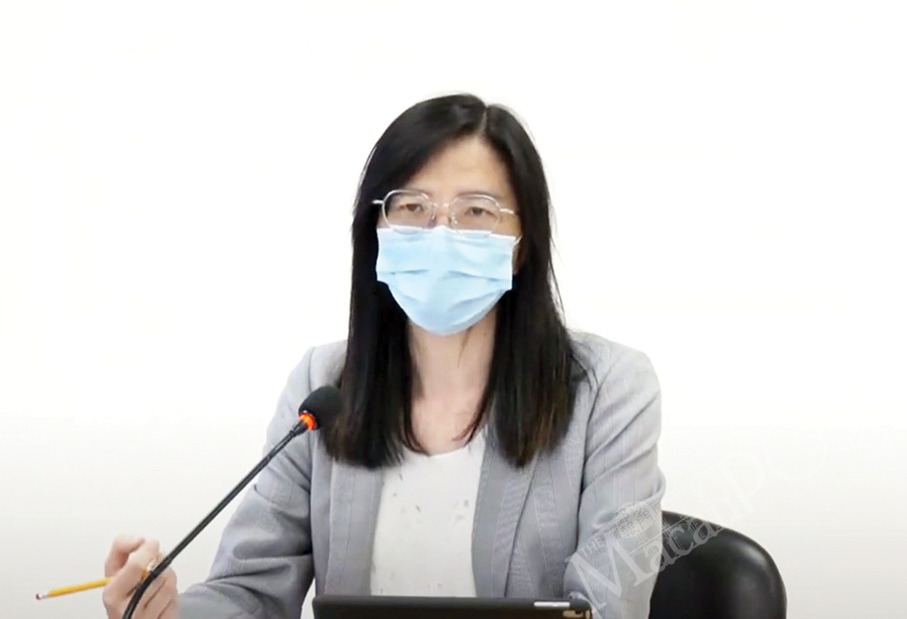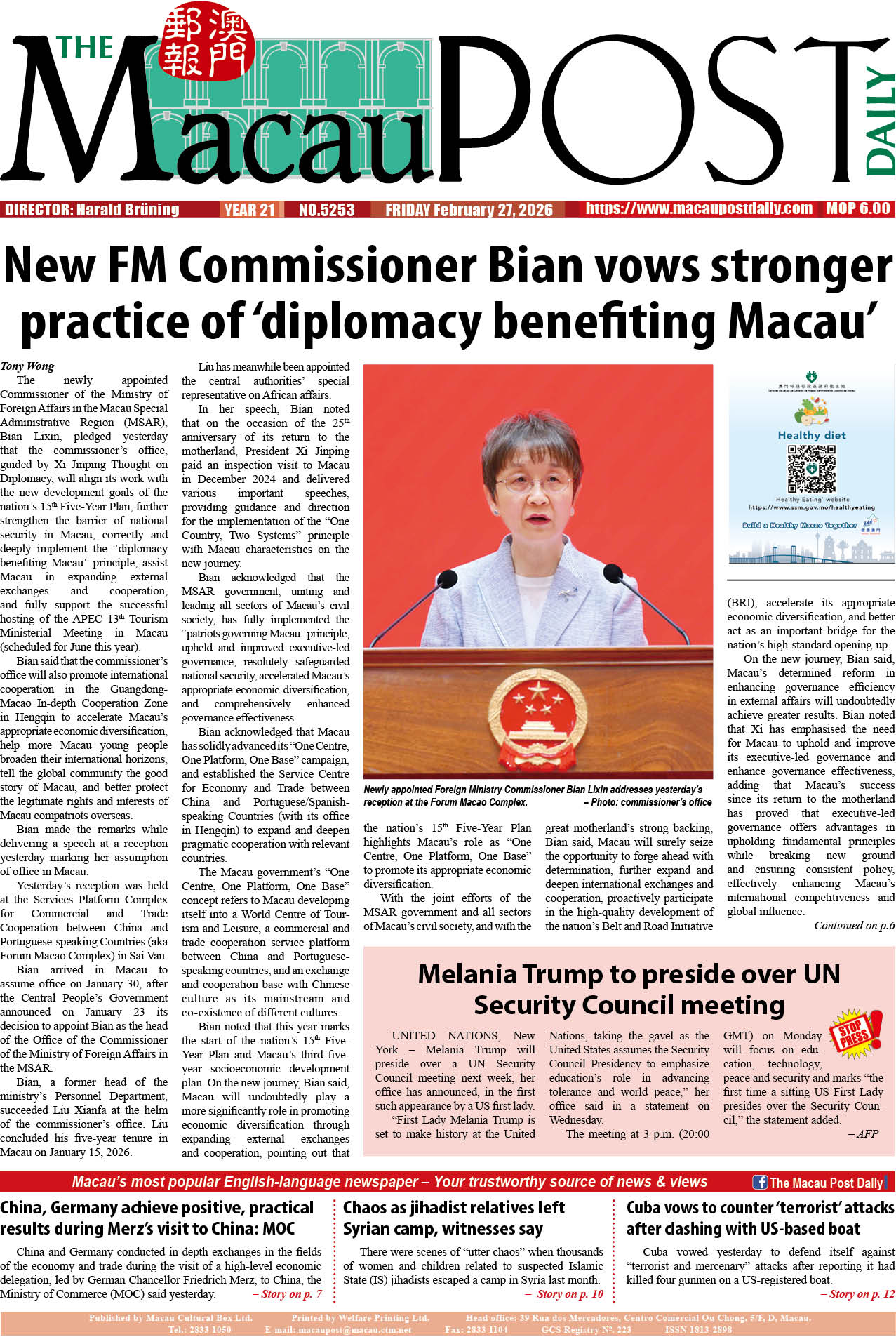Addressing yesterday’s weekly press conference about Macau’s novel coronavirus situation, Leong Iek Hou, who heads the Communicable Disease Prevention and Control Division of the Health Bureau (SSM), reaffirmed the importance of the government’s regular mandatory nucleic acid testing (NAT) for those working in high-risk COVID-19 key occupations during Macau’s normalised prevention and control period in the ongoing fight against the novel coronavirus.
Leong said that regular nucleic acid testing for those working in occupations and professions that are potentially subject to a higher risk of getting infected with the novel coronavirus was “very important” for the government to detect possible COVID-19 positive cases in the community as early as possible in case they have caught the novel coronavirus imported into Macau.
Leong also said yesterday that the government’s extended regular NAT programme for high-risk COVID-19 key occupations now covers around 188,000 people, around 30,000 people more than before June 18, when Macau’s latest COVID-19 outbreak began.
The recent COVID-19 outbreak, Macau’s worst since the start of the pandemic nearly three years ago, is also known in Chinese as “618 outbreak”, which started to subside around a month ago. “618” refers to the fact that the outbreak started on June 18.
Since Macau returned to its normalised COVID-19 prevention and control period on August 8, the Health Bureau has added more occupations and professions to its regular mandatory NAT programme for high-risk COVID-19 key occupations than before the 618 outbreak. Around four dozen occupations and professions are covered by the current version of the government’s regular mandatory NAT programme. They are subject to different testing frequencies depending on their respective COVID-19 risks, namely a nucleic acid test every day or every other day, a nucleic acid test plus a rapid antigen test (RAT) every four days, and a nucleic acid test every seven days.
Certain occupations and professions are listed in the government’s regular mandatory NAT programme for two main reasons. The first group comprises those who entail a higher risk of getting infected with COVID-19, such as those whose jobs require them to be in contact with people or items arriving from COVID-19-affected countries and regions, while the second group comprises those whose possible COVID-19 infection is very likely to result in an outbreak, such as prison staff and those working in day nurseries.
According to the Health Bureau’s announcements early this month about the extended coverage of its regular mandatory NAT programme, public bus, school bus and coach drivers, who were not covered by the programme before June 18, are newly covered by the extended version of the programme. In addition, cleaning staff and security staff working for certain indoor venues are also added to the programme. Before June 18, cleaning staff and security staff were not covered by the programme.
Reporters asked during yesterday’s press conference whether the Macau government would possibly terminate its regular mandatory NAT programme for key occupations in future. Leong reaffirmed that regular nucleic acid testing for those working in key occupations aims to detect possible COVID-19 carriers in the community as early as possible, enabling the government to isolate them more quickly and thereby reducing the likelihood of the novel coronavirus spreading to more people in the community.
Leong underlined that according to the requirements of the Protocol for COVID-19 Prevention and Control (9th Edition) published by the Joint COVID-19 Prevention and Control Mechanism of the State Council, regular nucleic acid testing for those working in high-risk COVID-19 occupations is “very important” for any places that are subject to a risk of having new COVID-19 positive cases. Their regular nucleic acid testing is an important part of the government’s normalised COVID-19 prevention and control work, Leong said.
Coverage subject to changes
Leong did not mention whether the local government’s regular mandatory NAT programme for high-risk COVID-19 key occupations could be terminated in the long term. But she said that the local government will constantly assess the COVID-19 risk that Macau is facing and amend the occupations and professions covered by the programme and their respective testing frequencies accordingly.
Leong also reaffirmed that according to anti-COVID-19 experiences in various cities and regions in the mainland, regular nucleic acid testing for those with a higher risk of getting infected with COVID-19 is very important for early detection of possible COVID-19 transmissions in the community.
188,000 covered by regular NATs
Moreover, Leong also noted that the government decided to add more occupations and professions to its regular mandatory NAT programme for COVID-19-risk key occupations for normalised novel coronavirus period in the wake of the 618 outbreak. The programme currently covers around 188,000 people, an increase of between 20,000 and 30,000 people from before June 18, Leong said.
Leong said that before June 18, the regular mandatory NAT programme put more emphasis on those whose jobs require them to be in contact with people or items arriving from COVID-19-affected countries and regions, such as those working in the frozen food sector.
Leong said that after the 618 outbreak, the government decided to add cleaning staff and security staff working for certain indoor venues, whose possible COVID-19 infection is very likely to result in a community outbreak, as well as some other occupations and professions with a higher risk of getting infected with COVID-19, to its regular mandatory NAT programme.
Meanwhile, Leong also reaffirmed that all employees covered by the government’s regular mandatory NAT programme, regardless of their respective COVID-19-risk levels, do not need to pay for their tests. Leong noted that while the government will pay for nucleic acid tests undergone by those with a higher COVID-19 risk, the tests undergone by those with a relatively lower risk will have to be paid by their respective employers.
However, Leong also said that the results of tests paid for by the government cannot be used for crossing the Macau-mainland border, while employees can use the results of tests paid by their respective employers to cross the border.
Leong also reaffirmed that the negative results of nucleic acid tests carried out in the mainland are accepted by the Macau government’s regular mandatory NAT programme as long as the test results are also displayed on the Macau Health Code, meaning that employees covered by the programme do not necessarily undergo their tests in Macau.
In Macau, each COVID-19 nucleic acid test costs 50 patacas.
BioNTech jabs for kids aged from 6 months to 4 years
Meanwhile, Leong also said that the Macau government is still discussing its purchase of BioNTech mRNA vaccines specifically for children aged at least six months but under five years with the German manufacturer.
The Macau Health Bureau first revealed early this month its plan of purchasing BioNTech mRNA jabs that had been successfully developed for children aged from six months to four years.
Currently, BioNTech mRNA jabs are administered to those aged five or over in Macau, while the other type of COVID-19 vaccine currently available in the city, China’s Sinopharm inactivated vaccine, is used for those aged three or over.
Leong noted yesterday that children aged at least six months but under three years in Macau are unable to be vaccinated against COVID-19. She also noted that BioNTech mRNA jabs specifically for children aged at least six months but under five years are being administered in some countries and regions, adding that the Macau government hopes that this type of BioNTech mRNA jabs can be delivered to Macau as soon as possible.
Meanwhile, Leong also noted that as of Wednesday, Macau had had no COVID-19 community cases for 33 consecutive days. The 618 outbreak resulted in 1,821 cases.

Leong Iek Hou, who heads the Health Bureau’s (SSM) Communicable Disease Prevention and Control Division, addresses yesterday’s press conference about the city’s COVID-19 situation. – Photo: GCS






